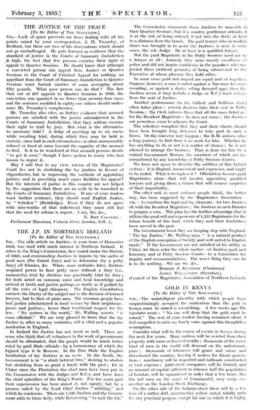[To the Editor of THE SPECTATOR.] SIR,—The able article on
Justices, in your issue of December- 23rd, was read with niueh interest in Northern Ireland. It refers to the King's CominissiOn, first issued under the Statute of 1800, and conunanding Justices to inquire by the oaths of good men (the Grand Jury) and to determine (by a petty Jury) all felonies, &c. When, some centuries later, Justices acquired power to hear petty cases without a Jury (i.e., summarily) trial by Justices was practically trial by Jury ; for both acted on common sense and local knowledge and arrived at truth and justice perhaps as surely as if guided by all the rules of legal chicanery. The English Constitution entrusts the liberty of the subject not to the decision of learned lawyers, but to that of plain men. The common people have had justice administered in local venues by their neighbours, jurors and justices ; hence their traditional respect for the law: • "-No system in the world," Mr. Walling asserts " is more efficient." We are very pleased to learn that the lay Justice-is; after so many centuries, still a vital and a popular institution'in England.
In Ireland the Justice has not fared so well. There are
'should who think that all volunteers in the work of government should be eliminated, that the people would -be much better ,ruled by-paid State officials—by a bureaucracy of which the ;highest type is in Moscow. In the Free State the English Institution of lay Justices is no more. In the North, the Government is in "a strait betwixt two," desiring to abolish but shrinking from so great a break with the past ; for in Ulster since the Plantation the chief men have been put in the Commission with the Judges and K.C.s, and have been the chief upholders of the King's POW-E. For ten years past theiraupersession has been aimed at, -not openly, but by a process called by the Lord Chief Justice " nibbling," and which he condemns. -There are 1,523 Justices and the Govern- ment adds to them daily, while threatening " to sack the lot." The Commission conimandt; 'thee -JUstiCes to assemble' in their Quarter Seisions.; but if a country gentleman attends, it is at the risk of being ordered, if not into the dock, at least to a distance from the bench.. The paid lawyer who in modern times was brought in to assist the Justices; is now, in stain• eases, the sole Judge.. He at least is-a mialified lawyer. • But the paid Magistrate in the Petty Sessions• need not be a lawyer at all : formerly they were mostly exmilleers of police and did not inspire confidence In the populace who sus.- pected them (without grounds) of being subservient to the Executive at whose pleasure they hold office.
In some cases paid and unpaid are equal and sit together. Suppose, however, a ease is called against a 'bus-man for over- crowding, or against a dealer selling decayed eggs, then the Justices (even if they include a Judge or K.C.)- must rar,.•ai, from the scat of Justice.
Another performance (in the Gilbert and Sullivan style) often takes place : several Justices take their seat in Petty Sessions : the Clerk informs them that all the eases listed ar.: for the Resident Magistrate : he does not come : the Justices are powerless, even to adjourn the Court.
The solicitors complain that they and their clients should
have been brought long distances to • take part in such a fiasco. Or the converse may happen : the R.M. arrives, after a long journey, to find there is no work for him. Whether he has anything to do or not is a matter of chance : - he is not allowed to arrange the business. That is done for hint by a central Government Bureau, the members of which arc un- encumbered by any knowledge of Petty Sessions Courts.
We have not space to describe the oddities of this hybrid system : it is illogical, inconvenient and expensive, and ought to be ended. What is to replace it ? Officialdom favours paid Magistrates alone—that will involve appointing qualified lawyers and giving them a tenure that will remove suspicion of their impartiality.
The other and, as most ordinary people think, the bettor way, has been suggested by the Magistrates Association
viz.: to combine the legal and lay elements—let two Justices sit with the Resident Magistrate ; the Justices in each Distrik to prepare a rota. This plan has the further advantage that it utilizes the good will and experience of 1,523 Magistrates for the• future benefit of this land, which they and their forefathers have served in the past.
The Goverment boast they are keeping step with Englamlw
" The lay Justice," Mr. Walling says, " is a natural product of the English conception of Society and well suited to English needs." If the Government arc not satisfied of his utility in Ulster, let them refer the whole matter—of Justices paid and honorary and of Petty Sessions Courts—to a Committee for inquiry and recommendations. The worst thing they can do is to do nothing.—We are Sir, &e., ROBERT J. KENNEDY (Chairman) JAMES WIULIAMSON (Secretary)
(Council of the Magistrates Association of Northern Ireland).




































 Previous page
Previous page